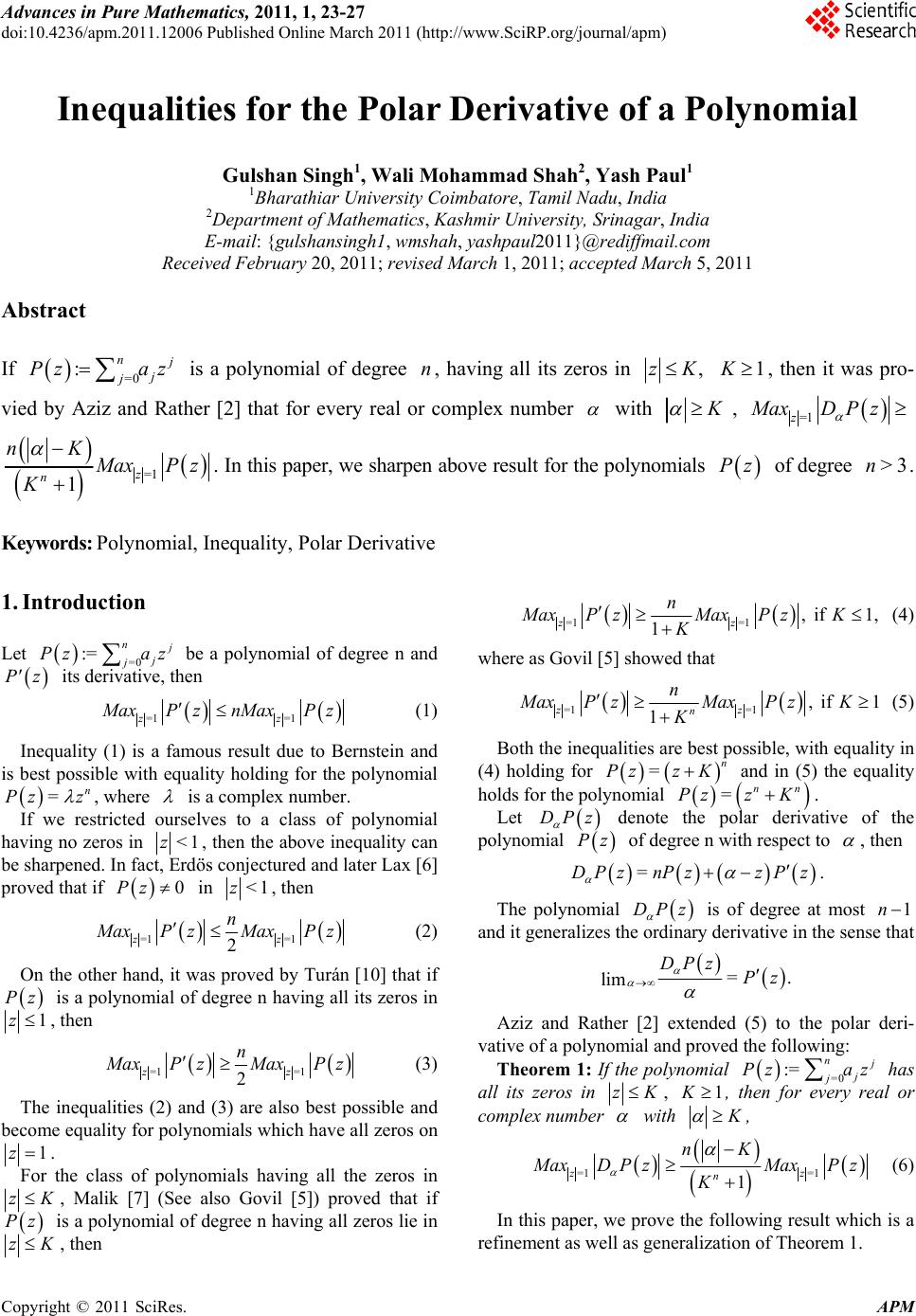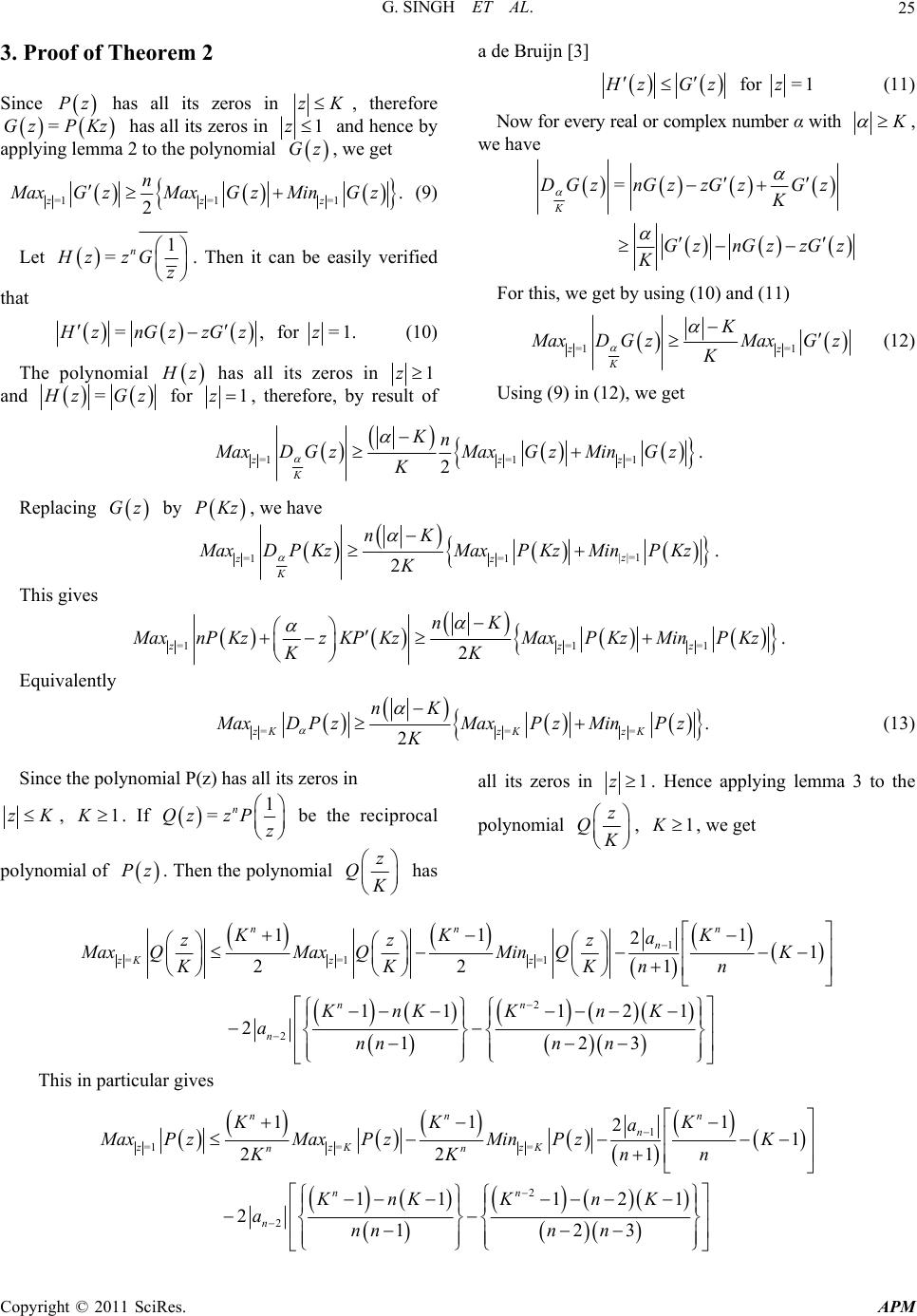 Advances in Pure Mathematics, 2011, 1, 23-27 doi:10.4236/apm.2011.12006 Published Online March 2011 (http://www.SciRP.org/journal/apm) Copyright © 2011 SciRes. APM Inequalities for the Polar Derivative of a Polynomial Gulshan Singh1, Wali Mohammad Shah2, Yash Paul1 1Bharathiar University Coimbatore, Tamil Nadu, India 2Department of Mathematics, Kashmir University, Srinagar, India E-mail: {gulshansingh1, wmshah, yashpaul2011}@rediffmail.com Received February 20, 2011; revised March 1, 2011; accepted March 5, 2011 Abstract If =0 :n j j Pz az is a polynomial of degree n, having all its zeros in ,zK 1K, then it was pro- vied by Aziz and Rather [2] that for every real or complex number with K , =1z MaxD Pz =1 1z n nK axP z K . In this paper, we sharpen above result for the poly nomials Pz of degree >3n. Keywords: Polynomial, Inequality, Polar Derivative 1. Introduction Let =0 := n j j Pz az be a polynomial of degree n and P' z its derivative, then =1 =1zz axPznMaxP z (1) Inequality (1) is a famous result due to Bernstein and is best possible with equality holding for the polynomial =n Pz z , where is a complex number. If we restricted ourselves to a class of polynomial having no zeros in <1z, then the above inequ ality can be sharpened. In fact, Erdös conjectured and later Lax [6] proved that if 0Pz in <1z, then =1 =1 2 zz n axPzMaxPz (2) On the other hand, it was proved by Turán [10] that if Pz is a polynomial of degree n having all its zeros in 1z, then =1 =1 2 zz n axPzMaxPz (3) The inequalities (2) and (3) are also best possible and become equality for polyno mials which have all zeros on 1z. For the class of polynomials having all the zeros in zK, Malik [7] (See also Govil [5]) proved that if Pz is a polynomial of degree n having all zeros lie in zK, then =1=1 , if 1, 1 zz n MaxPzMaxP zK (4) where as Govil [5] showed that =1=1 , if 1 1 zz n n MaxPzMaxP zK K (5) Both the inequalities are best possible, with equality in (4) holding for =n Pzz K and in (5) the equality holds for the p olynomial =nn zzK. Let DP z denote the polar derivative of the polynomial Pz of degree n with respect to , then =DP znP zz Pz . The polynomial DP z is of degree at most 1n and it generalizes the ordinary derivative in the sense that =. lim DP zPz Aziz and Rather [2] extended (5) to the polar deri- vative of a polynomial and proved the following: Theorem 1: If the polynomial =0 := n j j Pz az has all its zeros in zK , 1K, then for every real or complex number with , =1 =1 1 zz n nK axDP zMaxPz K (6) In this paper, we prove th e following result which is a refinement as well as generalization of Theorem 1.  G. SINGH ET AL. Copyright © 2011 SciRes. APM 24 Theorem 2: Let =0 := n j j zaz , 00 n aa be a po- lynomial of degree >3n, having all its zeros in zK , 1K, then for every real or complex number with , 1 =1=1 = 2 2 1 21 1 1 11 121 2, if >3. 123 n n zzzK n nn n K nK a MaxDP zMaxP zMinP zK nn K KnKK nK an nnn n (7) Remark 1: For =1 , Theorem 2 provides a refi- ment of a theorem proved by Shah [9]. Remark 2: For >1 , and for >1y, 11 1 y KyK yy and 1 y K y are both increa- sing functions of y and so the expressions 2 11 121 123 nn KnKK nK nnn n and 11 n KK n are always non-negative so that for polynomials of degree >3n, Theorem 2 is an improvement of Theo- rem 1. Dividing both sides of (7) by and letting , we get the following: Corollary 1: Let =0 =n j zaz , 00 n aa be a po- lynomial of degree >3n, having all its zeros in zK , 1 , then 1 =1=1 = 2 2 1 21 1 1 11 121 2, if >3. 123 n n zzzK n nn n K a n MaxPzMaxP zMinP zK nn K KnKK nK an nnn n (8) 2. Lemmas We need the following lemmas. Lemma 1: Let Pz be a polynomial of degree n, then for 1R. ==1 . n zR z axPzRMaxPz The above lemma is a simple consequence of the maximum modulus principle [8]. Lemma 2: If =0 := n j j Pz az , 0 n a, is a poly- nomial of degree n having all its zeros in 1z, then =1=1 =1 2 zzz n axPzMaxPzMinP z . This lemma is due to Aziz and Dawood [1]. Lemma 3: If =0 := n j j Pz az is a polynomial of degree n having no zeros in 1z, and =1 =z mMin Pz, then for 1R and >3n, =1 2 111 20 ,1 221 11 121 0123 nnn z nn RRR P MPRMax PzmR nn RnRR nR Pnnn n . The above result is a special case of a result due to Dewan, Singh and Mir [4, Theorem 1] with =1K and =1 . Remark 3: Here we note that for the proof of this result an additional hypothesis that 00P is required. A simple counter example in this case is =n Pz z.  G. SINGH ET AL. Copyright © 2011 SciRes. APM 25 3. Proof of Theorem 2 Since Pz has all its zeros in zK, therefore =Gz PKz has all its zeros in 1z and hence by applying lemma 2 to the polynomial Gz, we get =1=1=1 . 2 zzz n axGzMaxG zMinG z (9) Let 1 =n Hz zGz . Then it can be easily verified that =, for =1.HznGzzGzz (10) The polynomial z has all its zeros in 1z and = zGz for 1z , therefore, by result of a de Bruijn [3] for =1Hz Gzz (11) Now for every real or complex nu mber α with , we have = K DGznGzzG zGz K GznGzzGz K For this, we get by using (10) and (11) =1 =1zz K K axD G zMaxGz K (12) Using (9) in (12), we get =1=1 =1 2 zzz K Kn axDG zMaxGzMinG z K . Replacing Gz by PKz, we have ||=1 =1 =1 2z zz K nK axDP KzMaxP KzMinPKz K . This gives =1 =1 =1 2 zzz nK axnPKzzKPKzMaxP KzMinP Kz KK . Equivalently === . 2 zKzK zK nK axDP zMaxP zMinP z (13) Since the polynomial P(z) has all its zeros in zK, 1K. If 1 =n QzzP z be the reciprocal polynomial of Pz. Then the polyn omial z Q has all its zeros in 1z. Hence applying lemma 3 to the polynomial z Q , 1 , we get 1 ==1=1 2 2 11 1 21 221 11 121 2123 nn n n zK zz nn n KK K a zzz MaxQMax QMin QK KKKnn KnKK nK annn n This in particular gives 1 =1 == 2 2 11 1 21 1 22 11 121 2123 nn n n zzKzK nn nn n KK K a MaxP zMaxP zMinP zK nn KK KnKK nK annn n  G. SINGH ET AL. Copyright © 2011 SciRes. APM 26 which is equivalent to 1 ==1= 2 2 11 24 1 1 111 11 121 4 123 1 nn n n n zK zzK nn n nn n n n KK a KK MaxP zMaxP zMinP zK nn KK K KnKK nK Kannn n K (14) Using (14) in (13), we get 1 ==1= 2 2= 11 24 { 1 21 111 11 121 4 123 1 nn n n n zKz zK nn n nn n nzK n KK nK a KK MaxDP zMaxP zMinP zK Knn KK K KnKK nK KaMinPz nnn n K , if >3.n Equivalently 11 ==1= 2 2 1 21 1 1 11 121 2, if >3. 123 n n n zKz zK n nn n K nKK a MaxDP zMaxP zMinP zK nn K KnKK nK an nnn n (15) Since DP z is a polynomial of degree 1n and 1K, therefore by using Lemma 1, we get 1 ==1 n zK z axDP zKMaxDP z (16) Combining (16) and (15) we have 1 =1=1 = 2 2 1 21 1 1 11 121 2||, if >3. 123 n n zzzK n nn n K nK a MaxDP zMaxPzMinP zK nn K KnKK nK an nnn n This completes the proof of Theorem 2. 4. Acknowledgements The authors are extremely grateful to the referee for his valuable su ggestions. 5. References [1] A. Aziz and Q. M. Dawood, “Inequalities for a Polyno- mial and its Derivative,” Journal of Approximation The- ory, Vol. 54, No. 3, 1998, pp. 306-313. [2] A. Aziz and N. A. Rather, “A Refinement of a Theorem of Paul Turán Concerning Polynomials,” Journal of Mathematical Inequality Application, Vol. 1, No. 2, 1998, pp. 231-238. [3] N. G. de Bruijn, “Inequalities Concerning Polynomials in the Complex Domain,” Nederl. Akad. Wetench. Proc. Ser. A, Vol. 50, 1947, pp. 1265-1272; Indagationes Mathe- maticae, Vol. 9, 1947, pp. 591-598. [4] K. K. Dewan, N. Singh and A. Mir, “Growth of Polyno- mials not Vanishing inside a Circle,” International Jour- nal of Mathematical Analysis, Vol. 1, No. 11, 2007, pp. 529-538. [5] N. K. Govil, “On the Derivative of a Polynomial,” Pro- ceedings of the American Mathematical Society, Vol. 41, 1973, pp. 543-546.  G. SINGH ET AL. Copyright © 2011 SciRes. APM 27 doi:10.1090/S0002-9939-1973-0325932-8 [6] P. D. Lax, “Proof of a Conjecture of P. Erdös on the De- rivative of a Polynomial,” American Mathematical Soci- ety, Vol. 50, No. 8, 1994, pp. 509-513. [7] M. A. Malik, “On the Derivative of a Polynomial,” Jour- nal of the London Mathematical Society, Vol. 2, No. 1, 1969, pp. 57-60. doi:10.1112/jlms/s2-1.1.57 [8] Polya and G. Szegö, “Ausgaben und Lehratze ous der Analysis,” Springer-Verlag, Berlin, 1995. [9] W. M. Shah, “A Generalization of a Theorem of Paul Turán,” Journal Ramanujan Mathematical Society, Vol. 11, 1996, pp. 67-72. [10] P. Turán, “Über die Ableitung von Polynomen,” Compo- sitio Mathematica, Vol. 7, 1939, pp. 89-95.
|